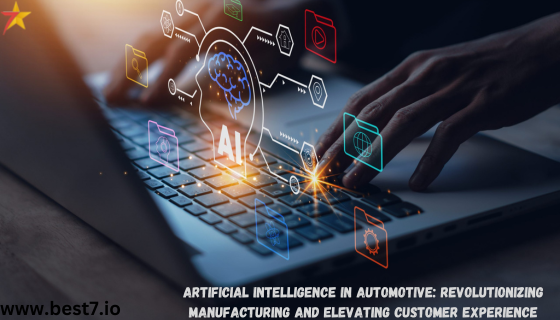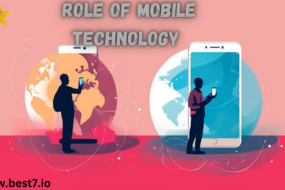
The auto industry, in recent years, has seen a major impact on this transformation because of the inclusion of Artificial Intelligence (AI) all through the process. With the rise of AI, manufacturing is getting smarter and better, customer service facilities are open for 24/7 and cars now are not just produced but created. This paper explores how AI has revolutionized the automotive industry, transforming both manufacturing and customer experience processes.
AI for Manufacturing: Automating Production Processes
Integrating AI in production has reshaped how manufacturing processes are done, ultimately making them practical and less expensive. Automotive companies have refined their operations through the use of machine learning algorithms and robotics which has increased productivity while also reducing waste.
- Smart Factories: This concept is also becoming more common within the automotive industry. These LOS use AI and IoT concepts to automate the manufacturing line as well as collect data in real-time. Smart Factories can boost productivity up to 20–30% and also they have significantly reduced operational cost report by McKinsey Used by manufacturers to monitor how machinery is performing and predict when that machinery might need maintenance, thus ensuring minimum downtime.
- Predictive Maintenance: To reduce equipment failures and to make its longevity, AI-driven predictive maintenance has been adopted. Manufacturers can detect problems early before they turn into big issues using sensor data. According to a research by Deloitte, predictive maintenance can cut down maintenance costs by 25%, and at the same time improve overall equipment effectiveness.
- Quality Control: Quality control has also been another frontier that AI occupied. Machine vision systems, when combined with AI detection capabilities, can visually analyze parts and catch faults considerably quicker than human beings. AI-based Quality Control systems by Siemens can minimize product defects up to 50% and allows only high-quality parts into vehicle assembly.
- Supply Chain Optimization: AI has transcended to more than just the production floor in the internal operations and revolutionized supply chain management for the automotive industry. Sophisticated algorithms study past data and market trends to optimize inventory levels and simplify logistics. Such an approach, driven largely by data, allows manufacturers to react swiftly to cater for changing demand patterns, preventing any excesses in stock and keeping costs at a minimum. The Boston Consulting Group recently found that companies using artificial intelligence in supply chain management have the potential to reduce costs by up to 10-15%.
Keeping Engagement and Service in Mind—The Role of AI in Customer Experience
But as remarkable as its achievements in manufacturing have been, at the same time, AI has been transforming customer experience. Among those with a vested interest in the auto sector, we all are already familiar with the steps where AI is being used to make interactions more personal and improve service delivery satisfaction.
- Personalized Recommendations: AI has allowed automotive manufacturers to analyze customer preferences and behavior, allowing them to provide personalized recommendations. Companies can thus learn about the exact requirements of their customers with data analytics to frame follow-up marketing strategies. Accenture’s research, in fact, has found that 75% of consumers are more likely to buy from companies that know their names and purchasing history, suggesting AI-driven personalization can improve customer satisfaction and loyalty.
- Artificial Intelligence Customer Support: The use of AI-based Chatbots and Virtual Assistants have transformed the way in which customer service is done within the automotive industry. Customers are provided with immediate answers to their questions 24/7 by these AI-powered solutions. Chatbots can assist with 80% of regular customer inquiries, meaning that human agents can concentrate on the more difficult issues, as stated in Gartner.
- Better User Experience: In-vehicle systems now include AI technologies to give users a great experience. This includes voice recognition systems enabled by AI to permit drivers to control navigation, media, and communication functions while keeping their hands on the wheel. A J.D. Power study showed vehicles with AI-powered user interfaces led to 20% higher customer satisfaction ratings.
- Predictive Customer Insights: The automotive companies could effortlessly predict their customer behavior through the application of predictive analytics in delivering enhanced customer experience. With this info, manufacturers can follow the patterns in which items are moving to predict what will move next by using historical data. This insight allows companies to be responsive to these customer issues, creating a better experience overall. Active research by McKinsey suggests that an organization can achieve a 15-20% increase in customer satisfaction using predictive analytics.
AI Innovations in Autonomous Vehicles
Autonomous vehicles represent a seminal turning point in the automotive industry, and AI stands at the center of this disruptive transformation. AI technologies have been instrumental in enhancing the capabilities of self-driving cars.
- AI in Autonomous Driving: The data from sensors and cameras of the self-driving cars are more than human eye can handle; it requires the use of machine learning algorithms to process that much data. These algorithms allow vehicles to identify and react towards traffic signals, pedestrians, road obstacles. Waymo states that this is the most experienced driver across 20M miles driven of real-world driving prior to 2019.
- Safety Features: AI has remarkably improved the safety features of self-driving cars. AI is now being used to make these micro-segmental decisions in real-time for tasks as critical as protecting the lives of the occupants and pedestrians with collision avoidance systems, adaptive cruise control, and so on. The National Highway Traffic Safety Administration (NHTSA) has published that autonomous vehicles using AI could reduce traffic fatalities by as much as 90%, demonstrating the life-saving capabilities of this technology.
- Traffic Management: Traffic management is among the use cases in which AI would need to play a critical role, given the increasing number of autonomous vehicles sharing road space. AI algorithms in smart traffic systems will optimize traffic flow to decrease congestion and reduce delays. Implementing AI-based traffic management systems could reduce travel times by 15-20%, thereby improving urban mobility, as per a report from the International Transport Forum.
Future Trends in Automotive AI
It will also be interesting to see the future trends in automotive AI. In the future, technologies like AI will only be more integrated into the automotive world and there are many cool opportunities for improvement and innovation.
- Smart City Integration: Next-gen automotive AI should also work in unison with smart cities. Vehicle to Infrastructure (V2I): These are connected vehicles that will contribute to urban infrastructure and better manage congestion for safe driving. The European Commission ranked this as the biggest indicator, promising that by 2030, half of all vehicles will hook up to smart city systems for real-time information sharing and optimized urban movement.
- Sustainable Developments: Whilst sustainable developments in the automotive industry will continue to dominate conversation, AI is poised to play a major role e.g. in the creation of EVs. Within the broader smart grid, systems powered by artificial intelligence will reduce energy consumption, improve charging infrastructure, and enhance battery management. As EV sales are forecast to weigh in at 10 million units annually by the end of 2025, this growth is also due to developments in AI.
- Safety and Security: Future car AI will also be increasingly focused on safety and cybersecurity. With vehicles becoming more connected, the importance of having robust cybersecurity defenses will increase. AI solutions will be built in, focusing on real-time model security of JLR vehicles. The World Economic Forum says the car industry could be saving itself up to $1 trillion by 2025 if it gets a handle on automotive cybersecurity risks.
- Prior Customer Initiation: It will optimize the AI incorporation for use in customer initiation so that the manufacturer can improve their ongoing relationship with consumers. By predicting customer demands in advance through predictive analytics, companies will be able to deliver personalized communications at the right time and thereby increase brand loyalty among consumers. According to PWC, 73% of consumers expect personalized experiences, the exact reason why the need for AI-backed customer engagement is essential for automotive brands.
Conclusion: The Future of Automotive Innovation
Artificial Intelligence is going to revolutionize the way cars are produced as well as customer experiences in the automotive segment. AI-driven innovations will bring about major enhancements for the industry in speed, security, and customer experience. A continued embrace of technology and customer experience improvements are shaping the future of the automotive industry, putting the sector on a path to sustainability for innovation.












